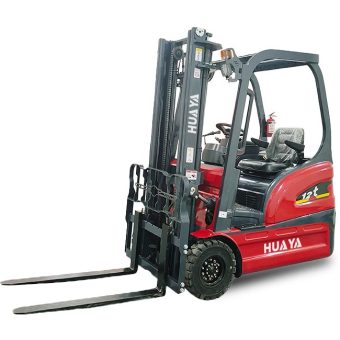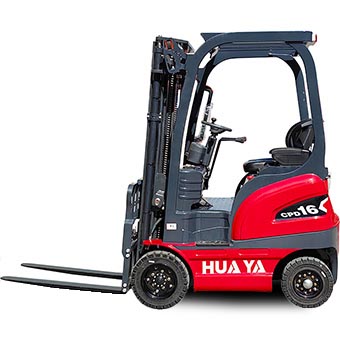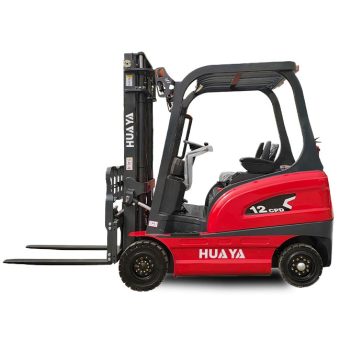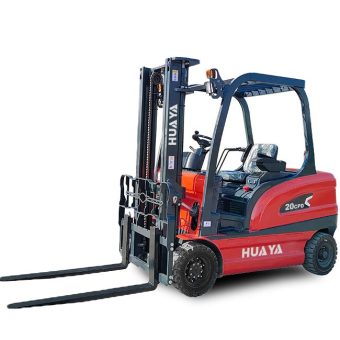
Notícias
Os armazéns dependem de maquinário eficiente para lidar com o trabalho pesado e, entre as ferramentas essenciais, as empilhadeiras são fundamentais. Mas com vários tipos e modelos disponíveis, entender qual empilhadeira é mais adequada para um armazém pode aumentar a produtividade e a segurança.

As empilhadeiras elétricas são uma escolha popular em armazéns, especialmente para operações em ambientes fechados. Conhecidas por seus benefícios ambientais, elas operam silenciosamente e não emitem fumaça nociva, o que as torna ideais para espaços fechados. As empilhadeiras elétricas da série CPD da HUAYApor exemplo, oferecem opções de potência que variam de 20 a 70 em capacidade, atendendo a uma variedade de necessidades de armazém.
Melhor para: Ambientes internos e ambientes que priorizam baixas emissões.
Vantagens: Baixo nível de ruído, emissões reduzidas, custos de combustível menores.
Especificamente projetadas para trabalhos em corredores estreitos, as empilhadeiras retráteis são compactas e altamente manobráveis. Esses modelos alcançam prateleiras altas, acessando paletes armazenados em alturas consideráveis, o que é essencial para maximizar o armazenamento vertical em espaços apertados.
Melhor para: Armazéns altos com corredores estreitos.
Vantagens: Alto alcance, manobrabilidade em corredores estreitos, operação ergonômica.
Para armazéns com alta demanda de separação de pedidos, as empilhadeiras selecionadoras de pedidos permitem que os operadores se elevem ao lado da empilhadeira para alcançar itens em prateleiras altas. Essa eficiência as torna uma excelente opção para centros de distribuição de varejo e comércio eletrônico em grande escala, onde a separação rápida é essencial.
Melhor para: Operações de coleta de pedidos de alto volume.
Vantagens: Recursos eficientes de separação, adaptabilidade de altura, tempo de inatividade reduzido.
Embora não sejam empilhadeiras tradicionais, as paleteiras e os walkie stackers são indispensáveis para a movimentação de paletes leves. Os walkie stackers são semiautomáticos e ideais para carregar e descarregar paletes, o que os torna ideais para armazéns menores ou tarefas específicas que não exigem empilhadeiras de tamanho normal.
Melhor para: Armazéns menores ou manuseio de materiais a curta distância.
Vantagens: Econômico, fácil de manobrar, ideal para cargas de baixo peso.
Esse tipo de empilhadeira é um dos mais comuns em armazéns. Equipadas com um peso na parte traseira para equilíbrio, as empilhadeiras de contrapeso podem lidar com várias cargas. Elas vêm em modelos elétricos e a combustível, oferecendo a flexibilidade necessária para atender a várias necessidades do depósito.
Melhor para: Operações de armazém para fins gerais.
Vantagens: Estabilidade e versatilidade, adequadas para operações em ambientes internos e externos.
A escolha da empilhadeira certa depende das necessidades específicas de seu depósito, que incluem fatores como espaço, tipo de carga e frequência de uso. Aqui está um detalhamento do que deve ser considerado:
Tamanho e layout do armazém: Se você opera em um ambiente com corredores estreitos, os modelos compactos e manobráveis, como as empilhadeiras retráteis, são ideais. Os armazéns maiores podem se beneficiar do contrapeso das empilhadeiras com maior capacidade de carga.
Requisitos de carga: Considere o peso e as dimensões de sua carga típica. Empilhadeiras elétricas como a série CPD da HUAYA oferecem capacidades variadas para lidar com diferentes tarefas de armazém.
Conforto e ergonomia do operador: Como os operadores de empilhadeiras geralmente trabalham por longas horas, o conforto e o design ergonômico são importantes para reduzir a fadiga e aumentar a produtividade.
Custo de propriedade: O tipo de combustível afeta o custo de propriedade. As empilhadeiras elétricas geralmente têm custos operacionais mais baixos e exigem menos manutenção em comparação com os modelos a diesel ou a gás.
A seleção da melhor empilhadeira para seu depósito pode aumentar significativamente a produtividade, a segurança e a eficiência. Compreender os pontos fortes exclusivos de cada tipo de empilhadeira, desde as empilhadeiras elétricas ecologicamente corretas até os modelos de alcance vertical de alto alcance, pode orientar sua decisão. Ao combinar os recursos da empilhadeira com as necessidades do depósito, você pode garantir operações tranquilas e econômicas, adaptadas ao seu fluxo de trabalho exclusivo.
As empilhadeiras elétricas são ideais para armazéns internos devido a suas baixas emissões e operação silenciosa.
Escolha uma empilhadeira para separação de pedidos de alto volume e prateleiras altas. As empilhadeiras de alcance são melhores para acessar corredores estreitos e armazenamento vertical.
Sim, as empilhadeiras elétricas oferecem custos mais baixos de combustível e exigem menos manutenção, o que as torna econômicas para uso a longo prazo.
Sim, as empilhadeiras de contrapeso podem operar em ambientes internos e externos, o que as torna versáteis para vários layouts de armazém.
Os principais fatores incluem o tipo de combustível, os requisitos de manutenção, a capacidade de carga e as necessidades operacionais específicas do depósito.



